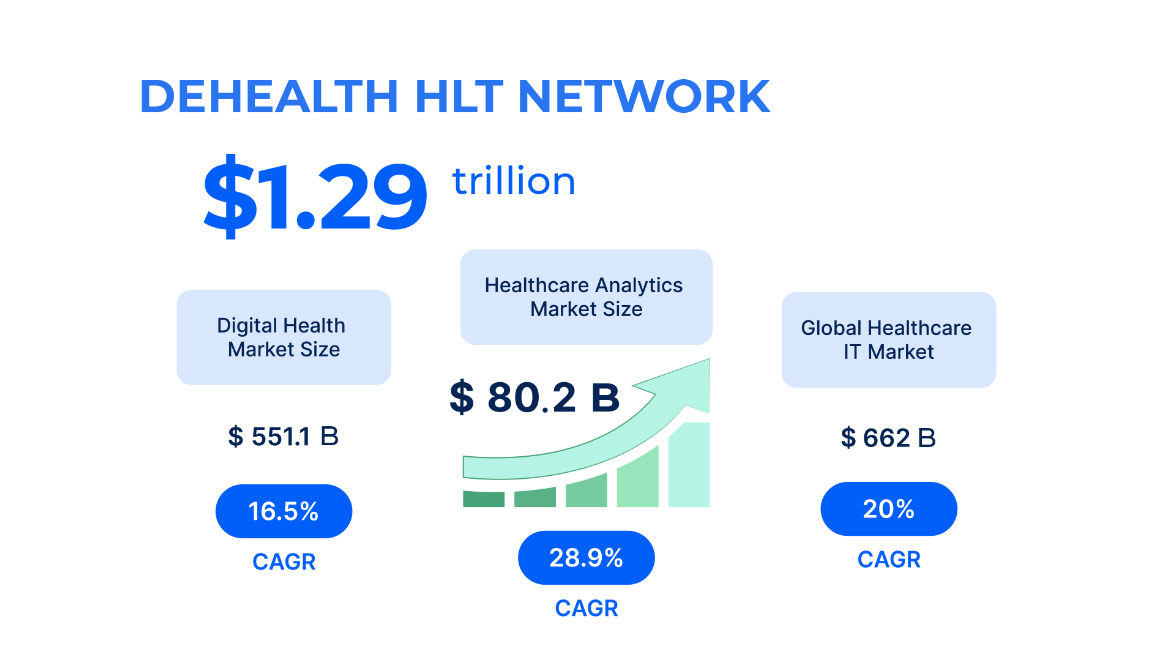HTL Token: Use cases
Created: 31 Jan, 2022
Updated: 3 Aug, 2022
Read post: 04:50 min read
The COVID-19 pandemic has unveiled the existing health challenges. The lack of a unified system for the reliable and secure exchange of medical data often leads to errors and delays in choosing the right treatment. Half of the world’s population is deprived of the opportunity to receive high-quality and affordable medical care. As a result, we face the declining trust in health and insurance systems due to low efficiency, industry-wide opacity and current practices.
What is HLT and why is the whole internet talking about it?
HLT, The “Health” (HLT) token is a relatively new phenomenon that is increasingly making news headlines. In other words, HTL is a legitimate medical data bridge between medical entities, end-users, and big data buyers. The job of HTL L3 protocol is to digitalise and secure global health data for everyone.
Although blockchain and cryptocurrencies have been around for years, DeHealth and HLT are the new words on the market. The abbreviation HLT stands for the health token in the DeHealth ecosystem and MedFi. To understand tokens, you need to figure out in what environment they exist — in this case, in the blockchain.
To put it shortly, the blockchain is a database that is simultaneously stored on a huge number of computers. In the traditional model of the Internet, all devices are connected to centralized nodes (in the form of servers or Internet providers), while the blockchain works in a different way. It does not contain any central nodes — all devices simultaneously store all information published on the blockchain.
Cryptocurrencies such as Bitcoin, Ethereum or Monero work exactly like they do thanks to blockchain technology.
Tokens represent a register entry within this blockchain. A distinctive feature of most tokens is the principle of fungibility. It can be compared to a currency such as one dollar or one bitcoin can be easily replaced with one dollar or one bitcoin belonging to other users.
Professor Yair Saperstein from New York, the Co-Founder & CEO of AVOMD shared his opinion on the development of DeHealth “The trend is clear. The future is DeHealth.”
More than currency. Why do you need HTL tokens?
According to the HLT usage model, there are two main goals — payment for transactions within the ecosystem and payment for acess to medical data. In the second case, the transactional payment is used to pay for access to medical data inside the ecosystem.
DeHealth Products Ecosystem section 4.1 www.hlt.network/whitepaper

A person’s medical record is located in the Hospital OS system. The medical data comes from licensed verified sources such as doctors, clinics, laboratories, medical/ fitness gadgets. After the process of data collection, it is depersonalized, processed, validated and sent to the Databank.
Let’s draw a case, where a customer comes who wants to buy certain data comes to the Databank. To request the Bank, the client must have HLT tokens on their account balance. Each API request from a client to the database automatically replenishes the balance of the user who can be a clinic or an entire state.
What are the ways to get HTL tokens?
- As a reward for activity in the loyalty program;
- As a reward for filling out a health card (for example, users, through changing their lifestyle to a healthier one, “mine” cryptocurrency and this does not harm the environment)
- For adherence to the treatment protocol (the user must follow all the doctor’s recommendations and receive tokens)
- Purchase of HLT tokens on well-known exchanges
- Data validation fee
- Grants from the DeHealth Foundation

20/20 is a US publicly traded company that does the “One Test” for the early detection of cancer. To do this, it needs the data it teaches AI later. In this example, we see the state represented by the Ministry of Health, which is an agent for 30 million Ukrainians on tokenization and sale of their data. Data owners (citizens) receive tokens on their account with DeHealth Bank. The popularization of HLT will lead to people improving their health and will be able to earn $ 50–100 monthly from the sale of their anonymized data. This is a basic type of income.
What can you buy with HLT?
- Purchase of an anonymized medical data or neural networks trained for specific tasks
- Purchase of medical goods and services
- Purchase of a subscription of a personal health assistant, mobile app and products for doctors and clinics https://www.dehealth.world/ecosystem/hospital-os" rel="nofollow
- Health insurance
In addition to paying for a subscription with tokens, users can insure their life and health right in the application by using tokens. For the user, this implies sheer benefits. In the absence of expenses from their bank account, the user will be able to provide themselves with accumulative insurance. The entire amount for insurance, or a significant part of it, can be covered thanks to tokens received after posting the patient’s medical history on the DeHealth marketplace.
- DeFi lending. The functionality of the application allows users, if necessary, to obtain a loan from other platform participants. They are provided in the form of tokens. This serves as insurance for lenders against misuse of funds by the recipient
Does HLT have a future?
The data market is developing extremely rapidly and over the past few years, blockchain technology and infrastructure have undergone significant changes and grew to become mature.

However, today there are still many questions in regards to what rules the DeHealth market can (and should) operate and in and in what areas HLT can be applied.
DeHealth is an innovator in terms of bringing crypto, AI and healthcare together to people. This project creates a new market, the market for decentralized healthcare and MedFi. Therefore, it is not possible to find a company with completely identical ideas and approaches.
Twitter: https://twitter.com/DeHealth_World" rel="nofollow
Telegram Announcement: https://t.me/dehealth" rel="nofollowchannel" rel="nofollow
Telegram Group: https://t.me/dehealth" rel="nofollow
Medium: https://medium.com/@DeHealth" rel="nofollow